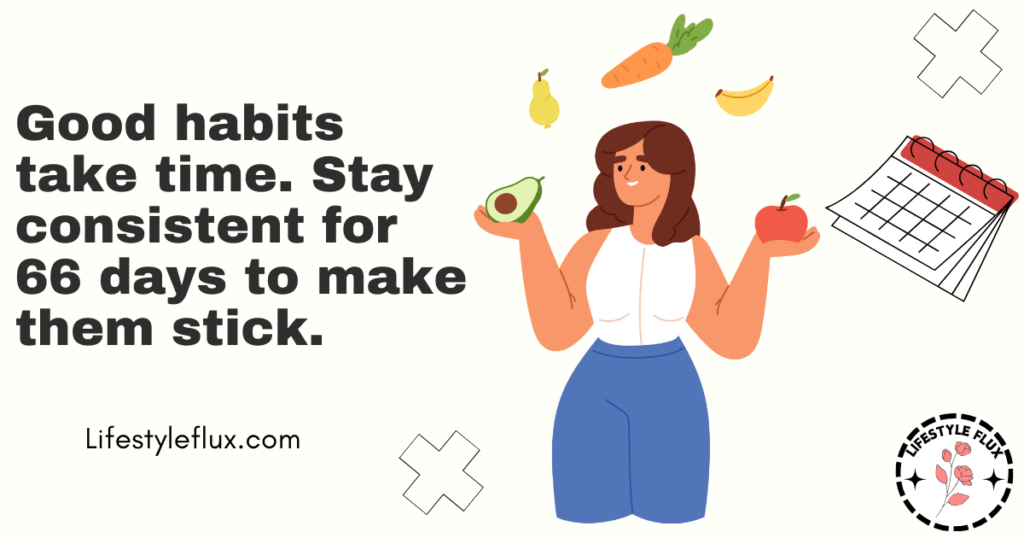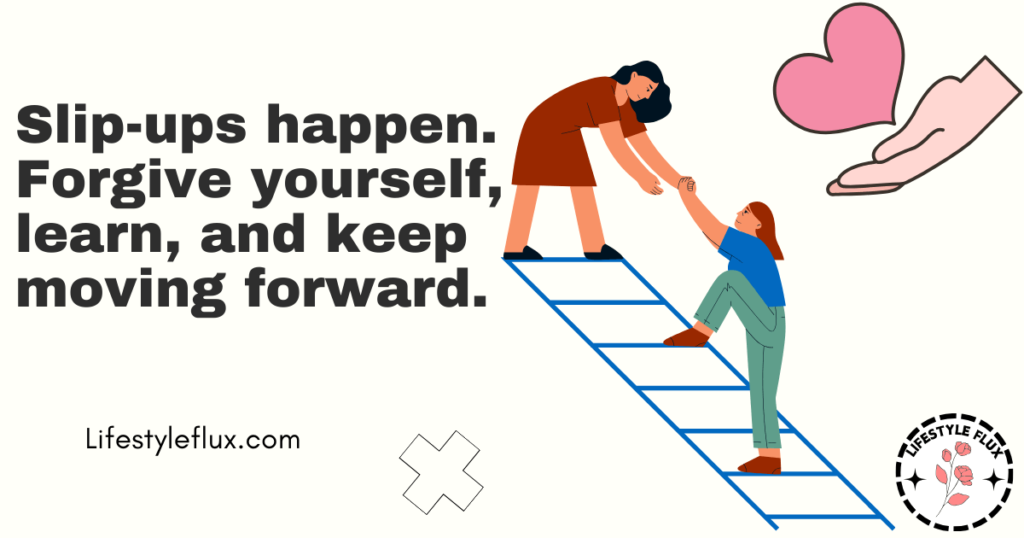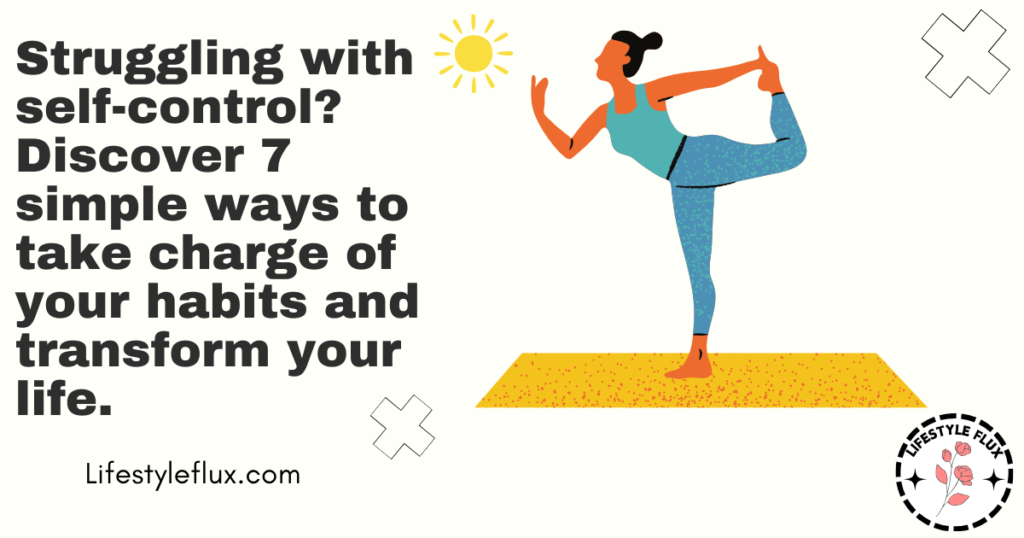You pick up your phone to check a random notification and end up doomscrolling for hours without realizing you are wasting your time. Don’t worry; you’re not alone in this loop. You probably think that staring at your phone, bingeing another Netflix show, watching TV, or browsing social media are all time-wasters.
But you still struggle to replace this bad habit with a productive one. Mastering self-control is a crucial yet challenging skill because it plays an essential role in your personal and professional growth, whether it’s about resisting temptations, consistently practicing good habits, or staying focused.
However, most people struggle because they don’t know how to tap into their inner discipline. In this article, I will tell you 7 simple ways to strengthen your self-control that help you to take charge of your impulses, stay on track, and improve your self-control for lasting control.
Table of Contents
1. Manual Habits
Forming good habits is a grueling process if you’re trying to exercise regularly well, there will be times when you want to skip the gym and just eat junk food.
You’ll find that you’re especially vulnerable to temptation within the first two months for a lasting habit to form it normally takes about 66 days of hard work. This window gives your body and brain the time to get accustomed to new behaviors.
As long as you’re consistent, new habits will start to feel unconscious and automatic by the end. But before that happens, you have to survive any new habits and growing pains.

You can’t cut yourself too much slack; you can’t let yourself cheat or talk yourself out of it. We’ve all had lazy days where these terrible judgment calls seemed like a great idea, but they never are, so what can you do to make this process easier?
Well, the simple answer is to force it, grit your teeth, and try your best to smile through the pain. This arduous process is an essential part of habit formation; your body will resist your old habits, will lead you astray, and it won’t always feel fun or natural. But you have to keep pushing. The more consistent you are, the faster your habits will form.
2. Daily Monitoring
No matter what you’re trying to accomplish, monitoring your behavior is a great way to keep yourself on the right path. Think of it like a to-do list. Doesn’t it feel great to look back and see all your goals crossed out? Monitoring works the same way, but instead of crossing things off, you’re filling them in.
This gives you the opportunity to physically see your progress happening, calorie counters are probably the most popular example of monitoring. These programs let you keep track of the total calories that you consume each day if you’re making progress these low totals will leave you feeling happy and confident.
You’ll be even more motivated to find the same success day after day. On the other hand, if you’re not making progress, monitoring reminds you of what you’re doing wrong.
It’s easy to simply ignore a bad habit out of sight, out of mind, right? But when it’s laid out on paper, you can’t pretend it didn’t happen. Daily monitoring ensures that those mess-ups don’t just slip through the cracks.
3. Managing Anticipation
Why is it so hard to resist buying the next big thing? How do you stop yourself from doing things you know you shouldn’t? We struggle to control vices like overspending because of something psychologists call anticipatory joy.
Imagine you see a commercial for the next generation phone oh, you love all the new features and suddenly start imagining what your life would be like if you had one.
You can finally take amazing pictures like you see online, and you can organize your whole life with the touch of a button. You subconsciously imagine extravagant vacations memorable experiences and lasting friendships.

You get so excited about the limitless possibilities that you forget one important thing: it’s just a phone. Anticipatory joy is a trick your brain plays on itself when you want something, and it doesn’t always think rationally.
The idea of improving your life stimulates the release of feel-good hormones; they reward anticipation and emotion. But makes it harder for you to think through your decisions, so once you start imagining happiness.
Your brain blindly fills in the gaps with friendship and fun. Most of the time, you’re not actually excited about whatever it is you want to buy. You’re excited about the lifestyle you imagine comes with it.
So, what happens after you buy the phone?
Obviously, your life doesn’t suddenly change, and you might find yourself feeling disappointed. You got so excited about that perfect mental image, but now that you’re here, you realize how unrealistic your expectations were.
You might feel frustrated or regretful, so you search for something else to make you happy. Before you know it, you’re trapped in the same deceptive vortex of anticipation and disappointment.
To clarify anticipatory joy affects more than just your spending habits. You get the same feeling when you ditch work to go to a concert or take a random road trip thinking it’ll be some life-changing journey.
Your emotions convince you that it’s worth it to be reckless and out of control. They sell you a vision of your future that, unfortunately, will never come true if you let your expectations get the best of you. You’ll end up jumping from one letdown to the next.
So, how do you keep your imagination under control? Anticipatory joy isn’t actually a bad thing; you’re just aiming it the wrong way. Instead of getting excited about the material things you want, concentrate on the person you want to be.
Start anticipating what your life will look like when you accomplish your goals. That way, you’re excited about something that will actually make you happy.
4. Patterned Living
To master self-control you need to look at your habits a little differently. Less disciplined people tend to use an act mindset in other words they view their individual actions as isolated incidents.
Let’s say you’re trying to be more productive; you might think there’s nothing wrong with procrastinating one time. But it’s never just once, is it whether you realize it or not, cheating tonight encourages you to cheat tomorrow; you’re rewarding your brain for breaking the rules.
So, by giving yourself a free pass you’re letting those bad habits sneak back in. This is why people with more self-discipline use a pattern mindset.
Imagine each action as one little part of a huge line of dominoes knocking just one down, which would mean you’re ruining the whole thing. While habit formation isn’t quite as dramatic, everything you do, good or bad, is connected somehow. The simple truth is stronger patterns make stronger people.
5. Calculated Distractions
Self-control isn’t about removing all distractions from your life, having no distractions can be as bad as having too many. There are very few people in the world who can actually live that kind of lifestyle.
Even though some distractions destroy productivity, others can play an important role. They relieve stress and give you a chance to recharge. A distraction may even inspire you or help you see things differently.
Breaks and distractions will build your self-control by avoiding frustration and fatigue. But there’s a right and a wrong way to get distracted. Let’s start with the wrong way. Distractions are meant to be short and sweet. They shouldn’t take up hours of your time or create more stress than they take away.
The point is to give your mind a quick breather, not to take it out of the game entirely. A calculated distraction should bring you a short burst of happiness. Its main job is to improve your mood and refresh your mind. That’s why music, crafts, and snacks are three of the best ways to distract your brain.
Music lifts your spirits and motivates you to keep pushing crafts like drawing and journaling, giving your brain some much-needed creative freedom. Finally, snacks give you a boost of energy, and they just taste good.
Like any muscle in your body, your brain can’t perform without a little rest and relaxation, so use these calculated distractions to make sure you’re recharging the right way.
6. Voiding Temptations
Distractions serve another valuable purpose for people learning self-control. When you imagine a distraction, you probably think of watching TV or browsing social media; there are time wasters you do instead of doing something more productive.
However, this isn’t the only type of distraction out there. A study from Columbia University found that distractions could be powerful tools to keep you from making mistakes.
In this famous study, researchers gave marshmallows to a group of four-year-olds to test their self-control. They told each child not to eat the marshmallow no matter how badly they wanted to.

As you might have guessed plenty of the kids didn’t listen but the ones who did stay disciplined by distracting themselves they sang or played games to get the marshmallow off their minds and you know what it worked.
You can do the same thing to avoid falling back into bad habits whether it’s cheating on your diet or spending too much money distractions can stop you from giving to temptation.
Every time you feel like breaking force your brain to think about something new but don’t just stare at your phone or binge another show on Netflix. You need distractors that make you feel fulfilled and motivated you can read a book, listen to a podcast, or just go do some chores.
The point is to associate self-control with something that makes you feel better about yourself. When you do hit a rough patch, this is an easy and effective way to get through without sacrificing the progress you’ve made. As time goes on, you’ll need to distract yourself less and less; eventually, those bad habits won’t even cross your mind.
7. Productive Forgiveness
We’ve talked a lot about preventing mess-ups and avoiding temptations but sometimes we just make bad decisions. You might skip a day break, your diet, or slip back into old habits so what do you do then you start by forgiving yourself one mistake can hurt your progress.
But it doesn’t mean you can’t come back; you shouldn’t fall into a downward spiral and throw away all of your hard work, even if you take one step backward.
You can always start moving forward again. The longer you wait to confront your mistakes, the harder it is to recover from them. Forgive yourself right away without letting yourself off the hook. Your mistakes can be incredibly motivating, but only if you make an effort to learn from them.
Conclusion:
Self-control isn’t about being perfect- it’s about your progress. By implementing these strategies in your day-to-day life you can create strong habits, resist temptations, and manage distractions more effectively.
Always remember setbacks are part of your journey but what matters most is how quickly you bounce back. Whether you are focusing on daily monitoring, forming good habits, or forgiving yourself after a slip-up, these tips will help you to become the disciplined, resilient person that you are striving to be.

Founder and CEO of Lifestyleflux.com, I bring years of expertise in self-improvement, wellness, and personal development to help you lead a happier, more balanced life. Through practical insights, eBooks, and consultations, I share actionable strategies rooted in experience and a passion for empowering others to unlock their full potential.

